-

新人教版高中英语必修3Unit 4 Space Exploration-Reading For Writing教学设计一
另一方面,其余的人反对这个计划,因为它可能会导致一些不好的影响。7.I hold the belief that space exploration not only enable us to understand how the universe began but also help us survived well into the future.我坚信探索太空不仅能够使我们了解宇宙的起源而且能够帮助我们更好地走进未来。8.I think we should spend more time and money exploring space so as to provide new and better solutions to people's shortterm and longterm problems.为了给人类的短期和长期问题提供更新和更好的解决方法,我认为我们应该花更多的时间和金钱来探索太空。9.From my point of view,it is wrong of young people to depend on their telephones too much,which may do harm to both their physical and mental health.在我看来,年轻人过度依赖手机是不对的,因为它们可能会对他们的身心健康都有害。最近你班同学就“人类是否应该进行宇宙探索”这个问题进行了激烈的讨论。有人认为,探索宇宙不仅让人类更好地了解宇宙的发展,还可以用来指导农业生产,以及把一些探索太空的高新技术用于现实生活;也有一些人认为探索太空花掉了大量的人力物力;影响了人们的生活水平。请你根据以下情况写一篇报告并发表自己的观点。注意:1.写作内容应包括以上全部要点,可适当发挥,使上下文连贯;

新人教版高中英语必修3Unit 5 The Value of Money- Discovering Useful Structure教学设计
Step 3 Meaning1. 过去将来时表示从过去某一时间来看将要发生的动作或存在的状态, 常用在宾语从句中。一般由“would/should +动词原形”构成。She hoped that they would meet again someday. 她希望将来有一天他们能再见面。2. was/were going to+动词原形: 表示过去将要发生或很有可能发生的动作, 常用于口语中, 表示预言、意图或者打算等。He was going to start work the following week. 他打算下星期开始工作。3. was/were about to do: 常用来表示即将发生的动作, “刚要/正要做……”。注意该结构不与任何时间状语连用。I felt that something terrible was about to happen. 我感到某种可怕的事情即将发生。4.was/were to do: 表示“曾计划做某事”, 如果表示“本来计划做某事, 动作没实现”, 则需用 “was/were to have done”。She said she was to have told me about the accident. 她说她本来想告诉我关于事故的事。5.Start, go, come, leave, see, meet等动词的过去进行时: 表示就过去某一时刻而言即将发生的动作。She was coming later. 她随后就来。I had just put on my overcoat and was leaving to visit a friend of mine. 我刚穿上外套要去看我的一个朋友。

新人教版高中英语必修3Unit 5 The Value of Money-Listening &Speaking&Talking教学设计
4. A:We’d like to have someone to say a word at the beginning to welcome the group.B:↙Who?A:We thought that you or Dr.Johnson might do it.B用降调说Who,其意思是问,对方想让谁在开场时致欢迎词。Step 6 Pronunciation---Practice1. Listen to the short conversation and mark the intonation with ↗, ↙ or ↙, ↗. Then discuss with a partner what they intend to convey by using different intonation.Owner: You know what ?↗ It’s a million-pound bank note↙.Waiter 1: Really ?↗(question)Waiter 2: Really !↙(unbelievable and surprised)Waiter 3: Really ?!↙↗(first question then surprised)2. Listen to the conversations. Underline the parts that are stressed and mark the intonation. Then talk about the implied meanings of the responses with different intonations. Listen again and repeat.1) Henry: It’s a nice suit.Owner: Oh, it’s perfect!↙(The intonation means it is very suitable for Henry.)2) Henry: Well, that’s very kind of you.Owner: Kind, sir ?↗(what you said is not right) No, it’s kind of you. You must come whenever you want and have whatever you like. Just having you sit here is a great honour !!↙(welcome you to come again)3)Henry:Well, to be honest, I have none. Oliver:(happily) What luck!(excited) Brother↗, what luck!↙(It means “Didn’t you hear it?”)Henry: Well, it may seem lucky to you but not to me!↗(angry) If this is your idea of some kind of joke, I don’t think it’s very funny. Now if you’ll excuse me, I ought to be on my way.↙(If so, I would leave.)Roderick: Please don’t go↙...(hope Henry can wait for a moment)Part B Viewing and Talking---Describe people’s changing attitudes in a film clipStep 1 Before-listening---Tell the filmYou are going to watch part of the film The Million Pound Bank Note. Look at these photos and guess what happens in the film.

新人教版高中英语必修3Unit 5 The Value of Money-Listening &Speaking教学设计
Step 4: Listen again and decide if the following statements are true (T) or false (F).1 It was the first time Chen Liyan's story was reported. T口 F口2 Chen found 10,000 yuan in a small plastic bag in Taiyuan railway station口 F口3 Wang Zheng apologized to Chen because he couldn't offer her more money. T口 F口4 Chen took out a large loan to cure her daughter, T口 F口5 Wang set up a fundraising website for Chen's daughter after Chen told him about her situation. T口 F口Step 5:After listening, discuss the questions.1 What kind of person do you think Chen Liyan is?Chen Liyan is generous and honest because she returned a large sum of money to the owner.2 Did Chen return the money because she didn't need it?No. She returned the money because it was the right thing to do. Evidence for this is that she refused to accept the reward money because she felt that it had not been earned. 3 Is it common for people to do what Chen did?It depends on the culture. In some countries it is quite common to return money that has been found. In other countries, people believe "Finders are keepers!" 4 How did Wang Zheng feel about the return of his money?He must have been very happy and relieved to have gotten his money back. We know this because he thanked Chen repeatedly and even offered her a reward.5 Why did Ma Dongbao tell Wang about Chen's family?He must have had great sympathy for Chen and her daughter and wanted to help them.'We know this because he arranged help for them. 6 How did the news reporter feel about Chen's actions?The news reporter felt that it showed that money wasn't the most important thing in life. We know this because the reporter told us that this is what Chen believes. and then said, “that's a great attitude to take."

新人教版高中英语必修3Unit 5 The Value of Money-Reading and Thinking教学设计一
Everybody wants to get wealth.In today’s material world,making money or becoming wealthy symbolizes a person’s success and capability. Many people just make every effort, pay any price to attain greater wealth. With money,they can buy nice, large apartments in nice neighborhood. With money they can own luxurious cars. Wealth seems to bring all happiness in life.But is wealth the only road to happiness? Not really. There are many things in the world, which are beyond the means of money, such as friendship, love, health and knowledge. People are so preoccupied with struggling for money that they have no time or would not take the time to form or maintain friendship. What happiness can they feel living as lonely miserable creatures without love or friends in the world even if they accumulate tremendous wealth?In my opinion, people can’t do anything without money, but money is not everything. What money will bring you depends on your personal belief and goal in life. If you are kind enough to help others, especially the poor, money is a good thing to you. With it, you can do much more for the benefit of people and your country, and it will add to your own happiness. If you want money just for your own needs, you’ll never be satisfied or happy. In a word,you should have money spent for more people. Only then can money be the source of your happiness.Step 8 Homework4 students in a group, one acts Roderick, one Oliver, one servant and the fourth one acts Henry Adams, then listen to the tape, pay more attention to the difference between American English and British English in pronunciation, stress, tone.

新人教版高中英语必修3Unit 5 The Value of Money-Reading for Writing教学设计二
2. 您能看到, 我头发太长了。You can see that my hair is much too long.3. 无论什么时候, 只要您想回来就回来。Please come back whenever you want.4. 您仅有很少的头发要理! You only have too little hair to cut !5. 为您服务是我的荣幸!It is my honour to serve you!Step 9 Writing(Henry is walking down the street when he sees a sign for a place that cuts hair. He decides to have it cut. )H=Henry B=BarberH: Good afternoon, I’d like to have my hair cut, if I may. (The barber looks at Henry’s hair and continues cutting another man’s hair. ) Er, I’d really like a haircut. As you can see it’s much too long. B: (in a rude manner) Yes, I can see that. Indeed, I can. H: Fine, well, I’ll have a seat then. (He sits in one of the barber’s chairs. The barber turns to look at Henry. )B: It’s quite expensive here, you know! Are you sure you can afford it?H: Yes. I think so. (After his hair is cut, the barber tells Henry how much he must pay. Henry shows the barber the bank note. )B: Why Mr. . . (looks shocked)H: Adams. Henry Adams. I’m sorry. I don’t have any change. B: Please don’t worry! (wearing a big smile) Nothing to worry about! Nothing at all! Please come back whenever you want, even if you only have too little hair to cut! It will be my honour to serve you!Step 10 Pair workExchange drafts with a partner. Use this checklist to help your partner revise his/her draft.1. Are all the elements of a play included and in good order ?2. Do the character use suitable language ?3. Are the stage directions clear and useful ?4. Is the plot clear and exciting enough ?

新人教版高中英语必修3Unit 5 the value of money-Reading For Writing教学设计一
【参考范文】Narrator:(Henry is smiling as he leaves the restaurant. As he is walking down the street, he sees a sign for a place that cuts hair. He decides to get it cut. )H=Henry;B=Barber;R=rude manH:Good afternoon, I'd like to get a cut, if I may. (The barber looks at Henry's hair and continues cutting another man's hair. )Er, I'd really like a haircut. As you can see it's much too long. B:(in a rude manner) Yes, I can see that. Indeed, I can. H:Fine, well I'll have a seat then. (He sits in one of the barber's chairs. The barber turns to look at Henry. )B:It's quite expensive here, you know!Are you sure you can afford it?H:Yes. I think so. (In comes the rude man. )R:Hey you there. I need a haircut quickly. Can you do me straightaway?B:All right, then, get in the chair and I'll see what I can do. R:Thank you. (sits down in one of the barber's chairs)H:Excuse me, but I was here first. Aren't you going to do my hair first?B:This man's in a hurry. H:Well so am I!I insist that you cut my hair first. B:OK, but I'll have to be quick. This gentleman is waiting. H:Thank you. (They both become quiet. After his hair is cut, the barber tells Henry how much he must pay. Henry shows the barber the bank note. )B:Why, Mr . . . (looks shocked)H:Adams. Henry Adams. I'm sorry, I don't have any change. R:You're that Mr Adams! Well,I'm glad I waited or I might never have known it was you. B:Why, Mr Adams, please don't worry!(wearing a big smile) Nothing to worry about!Nothing at all!Please come back any time, even if you only need too little hairs cut!It will be my honour to serve you!

新人教版高中英语必修3Unit 1 Festivals and Celebrations-Listening &Speaking&Talking教学设计
The theme of this section is “Talk about festival activities and festival experiences”.Festival and holiday is a relaxing and interesting topic for students. This part talks about the topic from the daily life of students’. In the part A ---Listening and Speaking, there are three conversations among different speakers from three countries(Japan, Rio and China), where the speakers are participating in or going to participate in the festivals and celebrations. So listening for the relationship among them is a fundamental task. Actually, with the globalization and more international communication, it is normal for Chinese or foreigners to witness different festivals and celebrations in or out of China. In the Conversation 1, a foreign reporter is interviewing a Japanese young girl who just had participated in the ceremony of the Coming-of-Age Day on the street and asking her feeling about the ceremony and the afterwards activities. Conversation 2, Chinese girl Li Mei is witnessing the Rio Carnival for the first time, and her friend Carla gives her some advice on the costumes which enables her to match with the carnival to have a good time. Conversation 3, a Chinese guide is showing a group of foreign visitors around the Lantern Festival and introducing the customs of the festival to them. The three conversations have a strong vitality and insert the festival and cultural elements from different countries. So perceiving the festivals and cultures from different countries is the second task. At the same time, the scripts also insert the targeted grammar --- v-ing as attributive and predicative, which students can perceive and experience in a real context and make a road for the further study. That is the third task. In the Part B--- Listening and Talking, the theme is “Talk about festival experience”, which is the common topic in our daily conversations. During the conversation, Song Lin, a Chinese student, asked Canadian friend Max about how to spend Christmas. In the conversation, Song Lin talked about experience and the feelings during the Chinese Spring Festival, during which there are not only some enjoyable things but some unpleasant things. After the listening, perhaps students find there are some similarities between Christmas and the Chinese Spring Festival as there are some differences in the origins and celebrations. For example, people always visit friends and relatives, decorate their houses, have a big dinner together, chat and give presents to each other.

新人教版高中英语必修3Unit 2 Morals and Virtues-Discovering Useful Structure教学设计
1. 表示时间。Hearing these stories, I’m skeptical about the place. = When I heard these stories. . . 2. 表示原因。Not knowing his address, I can’t send this book to him. = Because/Since/As I don’t know his address. . . 3. 表示结果。His father died, leaving him a lot of money. =. . . and left him a lot of money4. 表示条件。Going straight down the road, you will find the department store. = If you go straight down the road. . . 5. 表示让步。Being tired, they went on working. =Although they were tired. . . 6. 表示行为方式、伴随情况或补充说明。He lay on the grass, staring at the sky for a long time. =. . . and stared at the sky for a long time注意:非谓语动词作状语时, 如所提供的动词不能和句子中的主语保持一致, 动词-ing形式必须有自己的逻辑主语, 通常由名词或代词来担任, 这就是独立主格结构。The last bus having gone, we had to walk home. (having gone的逻辑主语是the last bus, 而不是we)Weather permitting, the football match will be played on Friday. (permitting的逻辑主语是time, 而不是the football match)Step 7 Practice1. ________(study) hard, you are sure to get first prize. 2. People use plastic in their daily life, _______(leave) large amounts of waste. 3. ________(work) hard at your lessons, you are to succeed. 4. The old man, ____________(work) abroad for twenty years, is on the way back to his motherland. 5. ______________(finish) his homework, he was playing on the playground. Answers: 1. Studying 2. leaving 3. Working 4.having worked 5. Having finishedStep 8 HomeworkFinish the homework on Page 22.

新人教版高中英语必修3Unit 2 Morals and Virtues-Reading and Thinking教学设计
The topic of this part is “Learn to make choices in life”.The Listening & Speaking & Talking part aims at the moral dilemmas, and this part is about making choices in life. The heroin is Lin Qiaozhi, a famous medical scientist, made a great contribution to our country’s medical care. Most importantly, her life experience can inspire our students whether in studying or the development of career. she had moral dilemmas and life choices, which are similar to the students who will step into society. Besides, Lin has quite good virtues like kindness, self-improvement, insistence, job-loving , generosity and responsibility, which is worth being learned.Concretely, this article is a biography about Lin Qiaozhi. The article tells her whole life according the timeline, among which the life choices is emphasized. For example, whether married or chased her dream, returned home or stayed abroad, family or public, her choices all reflected her faith, spirit, responsibility and devotion.1. Fast reading to get the detailed information about Lin Qiaozhi; careful reading to do the deductive information.2. Learn the reading skills--deductive judgement according the context.3. Study the structure features and language features. 4. Communicate about Lin’s life choices and reflect their own life choices.1. Learn the reading skills--deductive judgement according the context.2. Study the structure features and language features.3. Communicate about Lin’s life choices and reflect their own life choices.Step 1 Lead in---Small talkWhat are some important life choices?Importance choices: university study, jobs and marriage partners. Because they can determine our future.

新人教版高中英语必修3Unit 4 Space Exploration-Reading and Thinking教学设计二
The theme of this unit focuses on “space exploration.” Students will learn about the training and experience needed to become an astronaut. The text is mainly about the development of space exploration. On the one hand, the text helps students to have a good understanding about the great feats humans have achieved, on the other hand, they will further understand the contributions that we Chinese have achieved, and feel confident and proud about our homeland and strengthen their love for our country. The teacher should instruct students to aim high and study harder to make great progress in the space career if possible.1. Read about the development and value of space exploration.2. Explore the mysteries of the universe and the achievements in space exploration.3. Skillfully use the vocabulary of this text to cultivate self-study ability 4. Develop cooperative learning ability through discussion.1. Enable the Ss to talk about the development and value of space exploration.2. Guide the Ss to summarize the main idea of each paragraph as well as the main idea of the text.3. Help Ss comprehend the main reasons for space exploration. Multi-media, textbook, notebooks.Step 1: Warming up and predictionLook at the title and the pictures of the text and predict what the text will be about?2. What are the main reasons for space exploration?

新人教版高中英语必修3Unit 5 The value of money-Reading and Thinking教学设计二
? Could you offer me some kind of work here?? I don’t want your charity, I just want an honest job.? Careless: I landed in Britain by accident.Step 7:Consolidation.? Find Henry? Roderick and Oliver were I .making a bet when they saw Henry, a poor young man. ? Know Henry? About a month ago, Henry was sailing and later he found himself carried out to sea by a strong wind. Fortunately, he 2.was spotted by a ship. And it was the ship that brought him to 3.England? Offer money to Henry ? Oliver and Roderick gave Henry a letter and told him that there was money in it. They 4.persuaded him to accept it, and made him 5.promise that it wouldn't be opened until 2 o'clock.Step 8:Language pointsa large amount of: a large quantity of; a great deal ofe.g. They bought a large amount of furniture before they moved their new house.make a bet: make an arrangement to risk money, etc. on an event of which the result is doubtful.e.g. We made a bet on the result of the match.permit sb to do something: allow somebody to do somethinge.g. My mother doesn’t permit me to ride in the street after it rained.by accident: as a result of chancee.g. I only found it by accident.stare at: look at somebody or something with the eyes wide open in a fixed gaze( in astonishment, wonder, fear, etc)to be honest: to tell you the truth; to be franke.g. To be honest, I don’t think we have a chance of winning.Step7 Homework:What do you think will happen to Henry? Will the bank-note help him or get him into trouble?
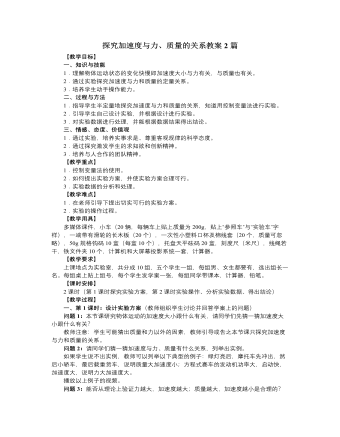
人教版新课标高中物理必修1探究加速度与力、质量的关系教案2篇
三、制定实验方案的两个问题:1.怎样测量(或比较)物体的加速度:引导学生思考、讨论并交流。学生可能会提出下面的一些方案:方法一:测出初速度为零的匀加速直线运动的物体在 时间内的位移 ,则 ;方法二:在运动的物体上安装一条打点计时器的纸带,根据纸带上打出的点来测量加速度;方法三:测出两个初速度为零的匀加速运动的物体在相同的时间内发生的位移 、 ,则 ;方法四:测出两个初速度为零的匀加速运动的物体在相同的位移内所用的时间 、 ,则 ;2.怎样提供并测量物体所受的恒力:教师提出:现实中,除了在真空中抛出或落下的物体(仅受重力)外,仅受一个力的物体几乎是不存在的。然而,一个单独的力作用效果与跟它大小、方向都相同的合力的作用效果是相同的,因此,实验中力 的含义指物体所受的合力。以在水平轨道上用绳牵引小车加速运动为例,小车受到四个力的作用,即重力、支持力、绳的拉力和轨道对小车的摩擦力(当物体运动的速度比较小时,我们可以忽略空气的阻力)。
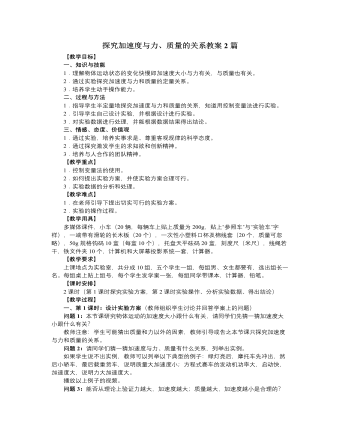
人教版新课标高中物理必修1探究加速度与力、质量的关系教案2篇
1.加速度与力的关系:实验的基本思路是保持物体的质量不变,测量物体在不同的力的作用下的加速度,分析加速度与力的关系。有了实验的基本思路,接下去我们就要准备实验器材,以及为记录实验数据而设计一个表格。为了更直观地判断加速度与力的数量关系,我们以 为纵坐标、 为横坐标建立坐标系,根据各组数据在坐标系中描点。如果这些点在一条过原点的直线上,说明 与 成正比,如果不是这样,则需进一步分析。2.加速度与质量的关系:实验的基本思路是保持物体所受力不变,测量不同质量的物体在该力作用下的加速度,分析加速度与质量的关系。有了实验的基本思路,接下去我们就要准备实验器材,以及为记录实验数据而设计一个表格。为了更直观地判断加速度与质量的数量关系,我们以 为纵坐标、 为横坐标建立坐标系,根据各组数据在坐标系中描点,根据拟合的曲线形状,初步判断 与 的关系是反比例函数。再把 图像改画为 图像,如果是一条过原点的斜直线,说明自己的猜测是否正确。
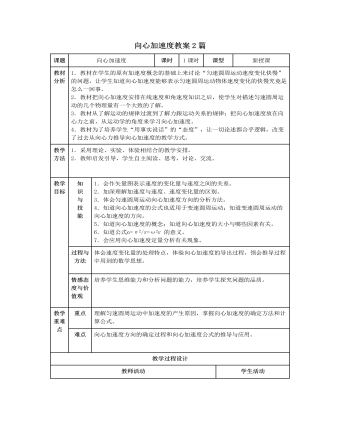
人教版新课标高中物理必修2向心加速度教案2篇
1.教材在学生的原有加速度概念的基础上来讨论“匀速圆周运动速度变化快慢”的问题,让学生知道向心加速度能够表示匀速圆周运动物体速度变化的快慢究竟是怎么一回事。2.教材把向心加速度安排在线速度和角速度知识之后,使学生对描述匀速圆周运动的几个物理量有一个大致的了解。3.教材从了解运动的规律过渡到了解力跟运动关系的规律;把向心加速度放在向心力之前,从运动学的角度来学习向心加速度。4.教材为了培养学生“用事实说话”的“态度”,让一切论述都合乎逻辑,改变了过去从向心力推导向心加速度的教学方式。1.采用理论、实验、体验相结合的教学安排。2.教师启发引导,学生自主阅读、思考,讨论、交流。知识与技能1.会作矢量图表示速度的变化量与速度之间的关系。2.加深理解加速度与速度、速度变化量的区别。3.体会匀速圆周运动向心加速度方向的分析方法。4.知道向心加速度的公式也适用于变速圆周运动;知道变速圆周运动的向心加速度的方向。
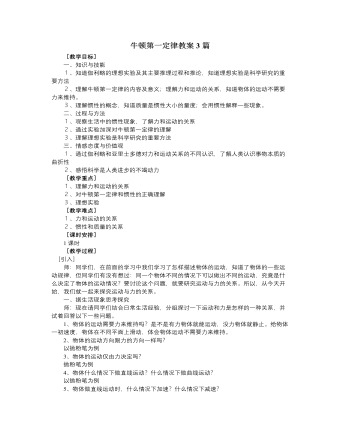
人教版新课标高中物理必修1牛顿第一定律教案3篇
一、知识与技能1、知道伽利略的理想实验及其主要推理过程和推论,知道理想实验是科学研究的重要方法2、理解牛顿第一定律的内容及意义;理解力和运动的关系,知道物体的运动不需要力来维持。3、理解惯性的概念,知道质量是惯性大小的量度;会用惯性解释一些现象。二、过程与方法1、观察生活中的惯性现象,了解力和运动的关系2、通过实验加深对牛顿第一定律的理解3、理解理想实验是科学研究的重要方法三、情感态度与价值观1、通过伽利略和亚里士多德对力和运动关系的不同认识,了解人类认识事物本质的曲折性2、感悟科学是人类进步的不竭动力[教学重点]1、理解力和运动的关系2、对牛顿第一定律和惯性的正确理解3、理想实验[教学难点]1、力和运动的关系2、惯性和质量的关系[课时安排]1课时[教学过程][引入]
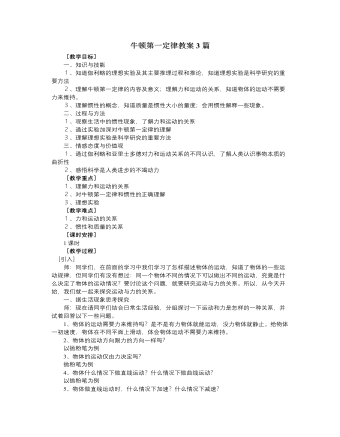
人教版新课标高中物理必修1牛顿第一定律教案3篇
一、知识与技能1、知道伽利略的理想实验及其主要推理过程和推论,知道理想实验是科学研究的重要方法2、理解牛顿第一定律的内容及意义;理解力和运动的关系,知道物体的运动不需要力来维持。3、理解惯性的概念,知道质量是惯性大小的量度;会用惯性解释一些现象。二、过程与方法1、观察生活中的惯性现象,了解力和运动的关系2、通过实验加深对牛顿第一定律的理解3、理解理想实验是科学研究的重要方法三、情感态度与价值观1、通过伽利略和亚里士多德对力和运动关系的不同认识,了解人类认识事物本质的曲折性2、感悟科学是人类进步的不竭动力[教学重点]1、理解力和运动的关系2、对牛顿第一定律和惯性的正确理解3、理想实验[教学难点]1、力和运动的关系2、惯性和质量的关系
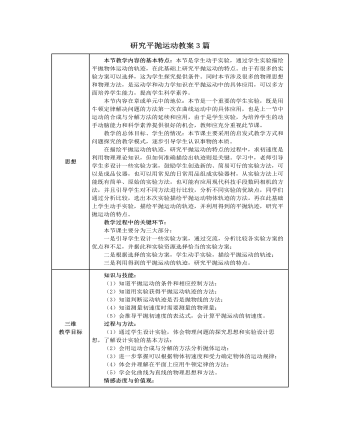
人教版新课标高中物理必修2研究平抛运动教案3篇
(给出仪器后先让学生思考如何设计实验、安装仪器、设计实验步骤,而后教师总结)实验步骤如下:①安装调整斜槽 :用图钉把白纸钉在竖直板上,在木板的左上角固定斜槽。②调整木板 :用悬挂在槽口的重锤线把木板调整到竖直方向,并使木板平面与小球下落的竖直面平行,然后把重锤线方向记录到钉在木板上的白纸上,固定木板,使在重复实验的过程中,木板与斜槽的相对位置保持不变。③确定坐标原点:把小球放在槽口处,用铅笔记下小球在槽口时球心在木板上的水平投影点O,O即为坐标原点。④描绘运动轨迹 :用铅笔的笔尖轻轻地靠在木板的平面上,不断调整笔尖的位置,使从斜槽上滚下的小球正好碰到笔尖,然后就用铅笔在该处白纸上点上一个黑点,这就记下了小球球心所对应的位置。保证小球每次从槽上开始滚下的位置都相同,用同样的方法可找出小球平抛轨迹上的一系列位置。取下白纸,描绘小球做平抛运动的轨迹。
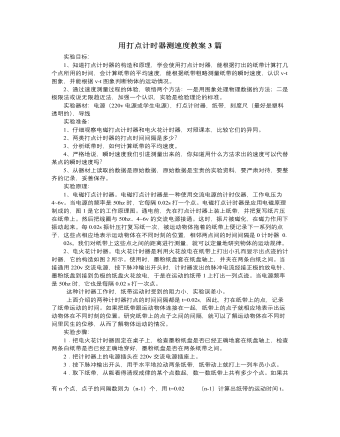
人教版新课标高中物理必修1用打点计时器测速度教案3篇
实验目标:1、知道打点计时器的构造和原理,学会使用打点计时器,能根据打出的纸带计算打几个点所用的时间,会计算纸带的平均速度,能根据纸带粗略测量纸带的瞬时速度,认识v-t图象,并能根据v-t图象判断物体的运动情况。2、通过速度测量过程的体验,领悟两个方法:一是用图象处理物理数据的方法;二是极限法或说无限趋近法,加强一个认识,实验是检验理论的标准。实验器材:电源(220v电源或学生电源),打点计时器,纸带,刻度尺(最好是塑料透明的),导线实验准备:1、仔细观察电磁打点计时器和电火花计时器,对照课本,比较它们的异同。2、两类打点计时器的打点时间间隔是多少?3、分析纸带时,如何计算纸带的平均速度。4、严格地说,瞬时速度我们引进测量出来的,你知道用什么方法求出的速度可以代替某点的瞬时速度吗?
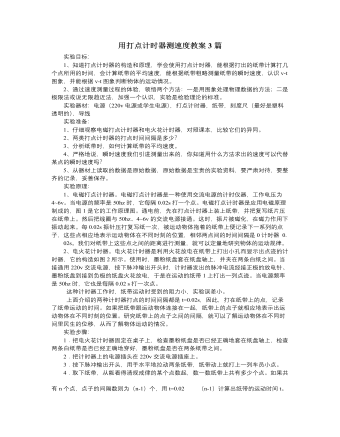
人教版新课标高中物理必修1用打点计时器测速度教案3篇
实验目标:1、知道打点计时器的构造和原理,学会使用打点计时器,能根据打出的纸带计算打几个点所用的时间,会计算纸带的平均速度,能根据纸带粗略测量纸带的瞬时速度,认识v-t图象,并能根据v-t图象判断物体的运动情况。2、通过速度测量过程的体验,领悟两个方法:一是用图象处理物理数据的方法;二是极限法或说无限趋近法,加强一个认识,实验是检验理论的标准。实验器材:电源(220v电源或学生电源),打点计时器,纸带,刻度尺(最好是塑料透明的),导线实验准备:1、仔细观察电磁打点计时器和电火花计时器,对照课本,比较它们的异同。2、两类打点计时器的打点时间间隔是多少?3、分析纸带时,如何计算纸带的平均速度。4、严格地说,瞬时速度我们引进测量出来的,你知道用什么方法求出的速度可以代替某点的瞬时速度吗?5、从器材上读取的数据是原始数据,原始数据是宝贵的实验资料,要严肃对待,要整齐的记录,妥善保存。